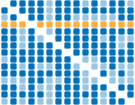Suburban Dream (English)
Walking the suburbs in the afternoon
In summer when the idle doors stand open
And the air flows through the rooms
Fanning the curtain hems,
You wander through a cool elysium
Of women, schoolgirls, children, garden talks,
With a schoolboy here and there
Conning his history book.
The men are all away in .offices,
Committee-rooms, laboratories, banks,
Or pushing cotton goods
In Wick or Ilfracombe.
The massed unanimous absence liberates
The light keys of the piano and sets free
Chopin and everlasting youth,
Now, with the masters gone.
And all things turn to images of peace,
The boy curled over his book, the young girl poised
On the path as if beguiled
By the silence of a wood.
It is a child’s dream of a grown-up world.
But soon the brazen evening clocks will bring
The tramp of feet and brisk
Fanfare of motor horns
And the masters come. | Uploaded by | P. T. |
| Source of the quotation | https://fromtroublesofthisworld.wordpress.com |
|
Külvárosi álom (Hungarian)
Külvárosokban, nyári délután,
mikor az ajtók tétlenül kinyílnak,
a szobákban huzat jár,
és függönyszél lebeg,
csak kóborolsz a hűs elíziumban,
körül gyerekhad, asszony, kert-zsivaj,
meg néhol egy diák is
történelmet magol;
a férfit elnyelte a hivatal,
a kísérlet, a bizottság, a bank,
Wickben vagy Ilfracombe-ban
a gyapotszállitó,
s a felgyülemlett egyhangú hiány
a zongorába tép, kiszabadul
Chopin, az örök ifjúság,
és nincs tanár sehol;
minden a béke arcát ölti fel,
a görnyedő fiú s a lány, akit
tűnődni vitt egy ösvény
s hívják a néma fák.
Gyerekkor, álom a felnőtt világról.
De már az esti réz-órák jelentik
a lábdobajt, a fürge
motorok harsonáit,
jönnek a tanárok. | Uploaded by | P. T. |
| Source of the quotation | G. Á. |
|
